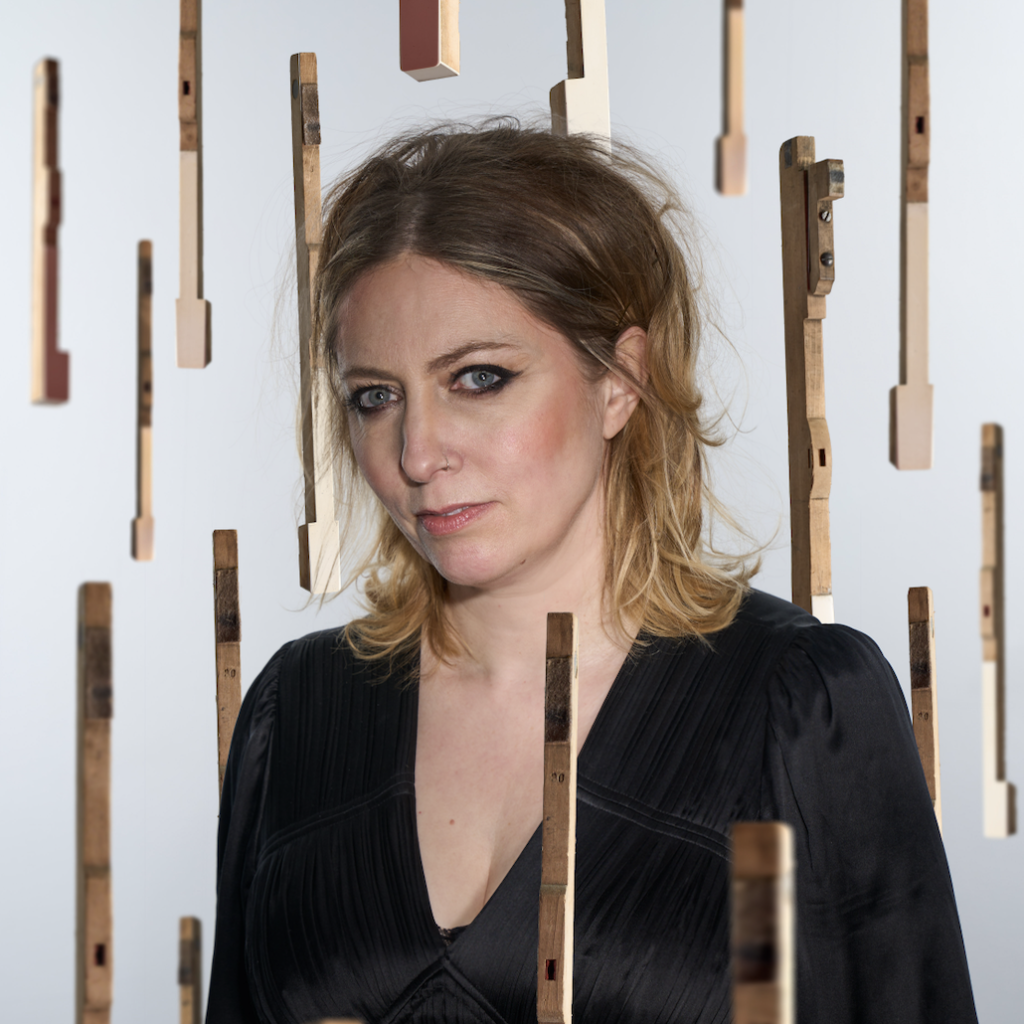Q&A with ground-breaking singer-songwriter, composer and producer Aurora Engine.
Deborah Shaw, known professionally as Aurora Engine, has enjoyed a remarkable year marked by significant achievements. Hailing from the north east of England, Shaw has established her artistic hub in Scotland’s capital. Fusing progressive electronica with live harp and piano performances, she captivates audiences with her unique blend of sound, all while infusing her native Geordie-tinged dialect into her singing.
Shaw’s lyrical exploration delves into a diverse array of themes, including her experiences as a single mother, reflections on the porn industry, feminist perspectives, musings on imaginary companions, the world of miniaturists, and even narratives of drunken altercations. Her latest album, “Secret Knock,” was released on February 9, 2024 and stands as a testament to her boundary-pushing artistry.

Can you tell us a bit about yourself, how did you get into music and how did Edinburgh become your creative base?
I came to Scotland about 10 years ago, after touring with theatre companies and as a pianist. I settled here, found a musical family and an actual family. I love Scotland, the music scene is wonderful, welcoming and has such an array of talent. I still feel a huge connection to the Co. Durham and Tyneside and visit often, gigging, (speaking fast and being understood) – I still have a musical family there.
I learned to play piano from my dad, who learned from his mother. We were a working class family, but I was sent to piano lessons eventually and went on to study music at college. I learned to play on beat-up old pianos, which is perhaps why now I love old wonky pianos over new ones.
I was actively discouraged from studying music post-school by teachers and some of my family as it was not deemed as a viable career option. I think it’s important to mention this as the impact was immense, as it is for many working class musicians emerging from small towns. I felt like I was constantly going against the grain in so many ways, being told music was just a hobby – I felt like I had to fight my corner all of the time. Luckily my parents were supportive, otherwise I wouldn’t be where I am musically.
Harps came into my life much later. I didn’t actually set eyes on a harp (aside from on the telly) until I was in my 20’s! There just weren’t any harps in small town Co. Durham. When I did finally manage to hire a harp and learned how to play, I was already an established musician. I was mesmerised by the instrument and it brought out a different side to my writing. I particularly loved singing in my accent when playing the harp, as it brought part of my culture to an instrument that was far removed from it and had not been available to me growing up.
Tell us more about your album Secret Knock?
This album has not come easily. I wrote much of it when I was a single mother parenting my daughter when she was a small baby, and I had to snatch small pieces of time to create it, against a backdrop of sleepless nights, exhaustion and postnatal anxiety. Being a single parent to a newborn is difficult – for me I wasn’t able to make music in the way I had before. I couldn’t get to rehearsals and collaborate with other musicians like I used to. Because of this isolation, I was forced to work alone much of the time. Whilst this was hard, it allowed me to really delve into production, and sound experimentation, and allowed me to create the sonic world I did. I felt like sound was growing around me, encompassing me, and eventually I was able to process it, and get it out into the world. Musically each song has its own world. Some are pop, some are sad, some are funny, in one I collected 100 whispers from members of the public and weaved them into a soundscape.
Are you a full-time composer or do you have a day job?
I’m a full-time musician. Over the last year I have mainly composed creating two live electronic scores for black and white films from the 1920’s and 40’s. I have also composed a suite of environmentally themed pieces ‘Terre’ exploring Scottish wildlife and landscape (premiered at Sound Scotland in 2022 and Edinburgh Festival Fringe this year, 2023 via the Made In Scotland programme).
I am musician in Residence at Earth In Common, an environmental charity in Leith delivering environmental themed instrumental and singing workshops, which explore land, nature and instigate discussion surrounding the Climate Crisis. I am creating a sound walk with the community which will be completed this year.
I also work with a variety of community groups making music and composing, including Crisis, Women’s Aid and The Welcoming charity supporting New Scots. I am also a song leader and MD two choirs.”
How would you describe your sound in terms of genre, and who are your main influences?
I struggle to define my genre! I guess audiences do that. I was classically trained, studied Jazz and contemporary music at University, and have since worked in so many different capacities as a musician my influences are wide and varied. I enjoy fusing real instruments with electronica, which I think has developed into a ‘trademark’ sound or is certainly a thread that runs through my work. Singer- Songwriter? Alternative? Progressive? Folktronica perhaps, I think it’s up to audiences to decide.
In terms of influences – Radiohead for certain. I have grown with them, and I love how they have developed their sound experimenting with electronics, but maintaining their audiences through strong songwriting. Bjork is another. I love her bonkersness and that she doesn’t always take herself seriously, and of course her wonderful imagination and musicianship.
